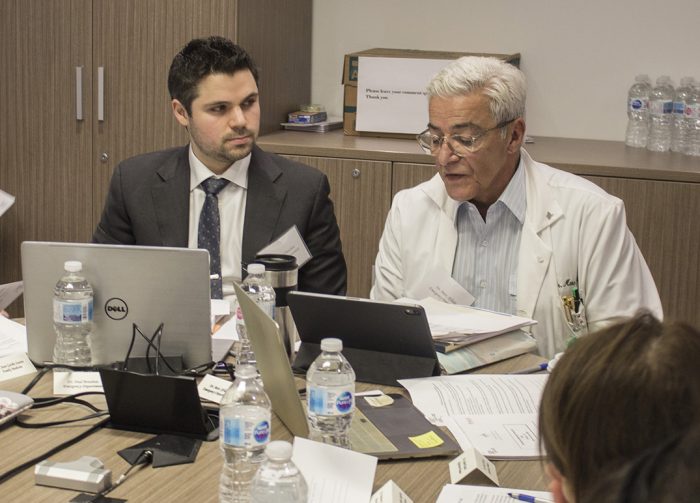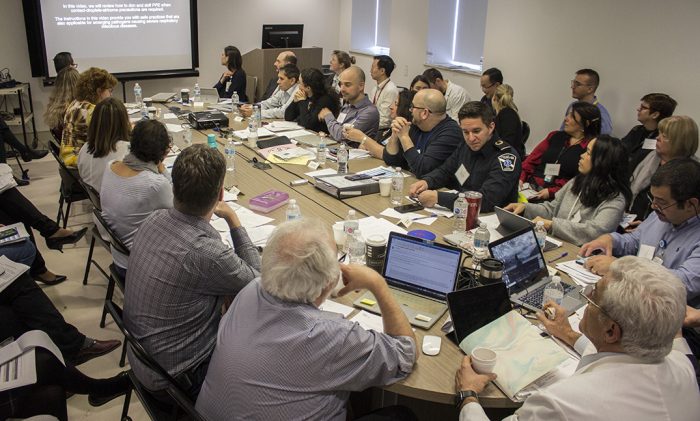Tabletop simulation involves numerous inter-disciplinary experts

Source: JGH
A pivotal gathering of more than 50 senior JGH medical specialists and healthcare professionals has enabled the hospital to further heighten its state of preparedness, in case patients with confirmed cases of the coronavirus (COVID-19) are admitted for treatment.
The JGH is one of four hospitals in Quebec—and one of two in Montreal, along with the Sainte Justine Hospital—that have been designated by the Ministry of Health and Social Services to treat patients with the coronavirus. The JGH’s Pavilion K, which opened in 2016, contains isolation areas that were specifically designed for patients with highly infectious diseases.

The wide-ranging, 3½-hour discussion on February 17 gave 20 key participants an opportunity to describe, in considerable detail, how their respective departments would deal with the patients.
The exercise, formally known as a “tabletop simulation”, focused on fictional but realistic scenarios, with the key participants explaining how they and their colleagues would respond to each set of circumstances.
The plans were then scrutinized by everyone at the meeting to determine how the proposed measures could be improved. In this way, unforeseen situations could be examined, resulting in modifications to the existing protocols.
Some departments will supplement the tabletop simulation with a real-life exercise—known as an in situ simulation—in which members of hospital staff go through the rigorous process of treating an individual who pretends to have returned from China with fever and cough. Afterwards, an analysis will be conducted of how staff responded in the out-patient clinics, Emergency Department, Intensive Care Unit and hospital rooms.
These activities are part of the hospital’s broader efforts to use simulation for training purposes, under Dr. Errol Stern, Director of the JGH Emergency Medicine Simulation Program. Instrumental in helping to coordinate the tabletop exercise were Dr. Julia Bernard and Dr. Kamy Apkarian, members of Dr. Stern’s team.
“Our hospital is very well prepared to handle the coronavirus,” Dr. Marc Afilalo, Chief of Emergency Services, said after the meeting. “Based on what I saw here today, I can confidently say that my expectations were exceeded. Everyone is obviously very committed to working closely together.”
Dr. Afilalo, who co-chaired and co-organized the meeting, said that even though the JGH already has contingency plans to deal with diseases such as Ebola and SARS, new measures had to be developed for the coronavirus, since each illness has its own set of risks and characteristics.
Even the hospital’s original coronavirus plans have been adapted and refined several times to respond to the evolving situation since the initial outbreak was reported in China, added Dr. Paul Brisebois, an Emergency physician who worked with Dr. Afilalo to chair and organize the session.
Dr. Brisebois noted that the meeting was especially useful, since it brought together numerous members of staff from many fields to ensure that all of them are on the same page and have a wide-angle perspective of the hospital’s plans.
Among the topics discussed at the tabletop simulation:
- how protective clothing and masks are properly put on and safely taken off
- what precautions are taken when a patient is brought to the hospital by ambulance
- what happens if the patient suffers a cardiac arrest or has a sudden need for more oxygen
- how staff keep track of who enters and leaves the patient’s room, and at what time they go in and out
- whether visitors—relatives, in particular—should be allowed into the patient’s room and, if so, under what conditions
- how the patient is prepared to be moved from the Emergency Department to the Intensive Care Unit
- how the patient is safely intubated
- what arrangements are made in Intensive Care for a social worker to meet with the patient’s relatives
Dr. Afilalo expressed the hope that no one would become ill and require hospitalization. “But the potential is there,” he said, “and we have to be prepared, even if we get more patients than we expected.”
Related coverage
CTV News | Jewish General designated as COVID-19 response hospital
Global TV | Jewish General Hospital ready to quarantine possible COVID-19 cases in Quebec
Global TV | As COVID-19 spreads in the United States, what does that mean for Canada?
La Presse | Jewish General Hospital: “Our hospital has been preparing for years”
CTV News | Third probable case of COVID-19 reported in Quebec, hours after second case is confirmed
March 5 2020

